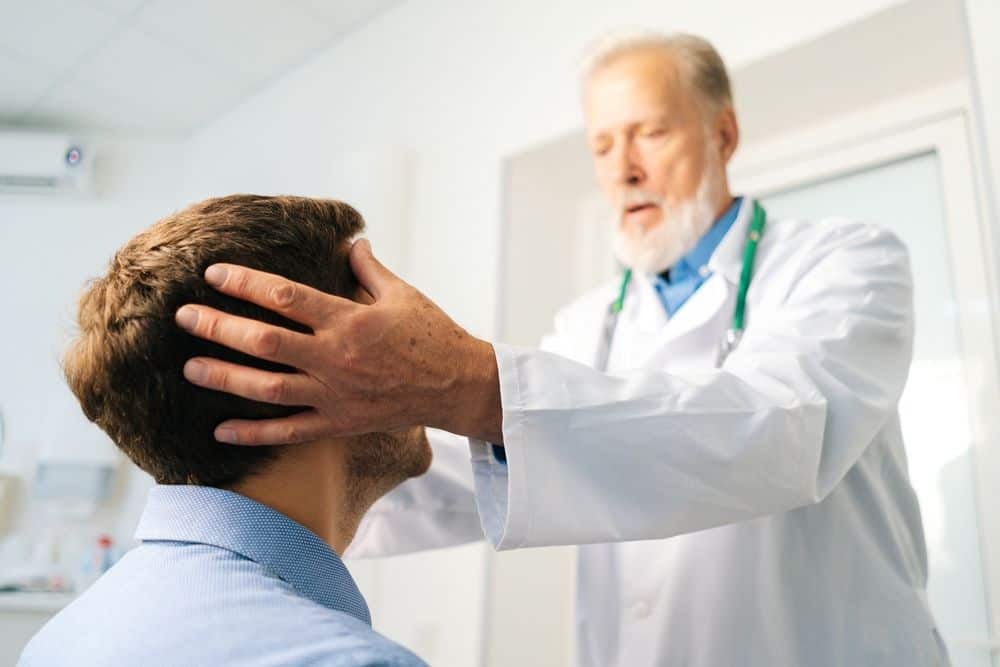Have you ever felt like there’s a tight band wrapped around your forehead and the back of your skull? That is one of the most common experiences people have when they get a tension headache. The most common type of headache is a tension headache. These headaches can cause pain behind your forehead and eyes and along the back of your head and neck. For many people, tension headaches may only happen a few times a month, while others may experience chronic tension headaches. If you are looking for tension headache relief, then you want to find quality treatment for headaches with a team of doctors you trust. Your doctor will want to determine what causes your tension headaches to help relieve tension headache symptoms. Here’s what you need to know about tension headaches and ways to get rid of a headache effectively.
What Causes Tension Headaches?
In order to effectively find a cure for tension headaches, your doctor will want to determine what specifically causes your pain and other symptoms. In general, tension headaches develop due to tightened or tense muscle contractions that occur in your face, along your scalp, and even in your neck and upper back. These are common causes of tension headaches.
Stress
A tension headache is also sometimes referred to as a stress headache. That’s because an increase in stress can cause you to tense your muscles and carry yourself differently. When you are stressed, you may notice your shoulders are raised higher, and you might even clench your teeth. Stress can also cause emotional effects like increases in anxiety and depression, which can cause physical symptoms like a tension headache.
Dental Problems
Clenching or grinding your teeth can lead to an increase in tension headaches. Temporomandibular joint (TMJ) disorders can also cause tension headaches. You put a significant amount of additional pressure on your jaw joints when you clench or grind your teeth. This can also cause tension in the muscles underneath your chin and along the sides of your neck. Dental problems can lead to muscle tension and poor joint function in your jaws, and tension headaches can develop as a result.
Eye Strain
Staring at a computer or phone screen for long periods of time can lead to eye strain. Our increased usage and reliance on digital devices have led to an increase in eye strain over the last few decades. Driving for long periods of time or reading in dim lighting can also cause eye strain. You may also experience eye strain if your vision prescription needs to be updated. Some people refer to eye strain as tired eyes or eye fatigue. When your eyes become tired, they tend to blink less, which can cause dry eyes. Common symptoms of eye strain include watery or itchy eyes, blurred vision, sensitivity to light, and tension headaches.
Fatigue
Tension headaches that develop infrequently are known as episodic headaches. This type of headache is more likely to occur due to a temporary trigger like fatigue. Perhaps you have not been sleeping well for a few days or job stress is keeping you up at night. You may start to feel excessively tired during the day, which can make it more difficult to concentrate and feel energized. Temporary bouts of fatigue in your life can lead to tension-type headaches. Interestingly enough, fatigue is also a symptom of a headache because the pain can cause you to feel more tired.
Illness
A sudden illness can also include symptoms like tension headaches. The common cold, flu, and sinus infections can all cause headaches along with other uncomfortable symptoms. A tension headache may develop after you have been coughing or sneezing a lot due to an illness. Coughs and sneezes may increase stress and strain on your face and neck muscles, leading to a tension headache.
Food & Drink
Certain foods and drinks can increase your risk of developing a tension headache. People who suffer from both episodic and chronic tension headaches have reported certain foods or drinks that trigger their headaches. Alcohol and caffeine are two common drinks that may trigger a tension headache. Not getting enough water throughout your day can also lead to tension headaches because your muscles need water to function at their best. Drinking water can also help flush out toxins that can cause an illness and help you feel better. Skipping meals, hunger, and low blood sugar can also trigger tension headaches.
Poor Posture
Poor posture is also a leading culprit of tension headaches. Our increased usage and reliance on technology has many people hunching forward and looking down at computer screens or handheld devices. This forward head posture also has a nickname: tech neck. When you hunch forward and tilt your chin down for long periods of time, this can strain the back of your neck and cause muscles that support your chin to weaken. Over time, this type of poor posture can contribute to uncomfortable symptoms like neck pain and tension headaches.
Signs and Symptoms of a Tension Headache
Your symptoms can also help determine what type of tension headache causes may be affecting you. The most common sign and symptom is a pain in your head that occurs behind your forehead, eyes, and along the back of your head. Tension headaches can also cause pain in your temples, which can make you want to hold your head in your hands and put pressure on the area to experience some relief. Pain from a tension headache is typically more of a dull pain and pressure that wraps around your whole head. In some cases, pain from a tension headache can become moderate or severe, causing more of a throbbing sensation on one or both sides of your face. You may also notice some tenderness in your forehead and scalp. A severe tension headache might make you feel like you have a migraine, though the best way to recognize what type of headache you have is whether or not other signs and symptoms of a migraine are present, like sensitivity to light and sound, nausea, and vomiting. When those additional symptoms are not present, you are more likely dealing with a tension headache.
How to Relieve Tension Headaches
 Your doctor may be able to determine the cause of your tension headaches after hearing about your symptoms, doing a physical examination, and discussing your medical history. In some cases, they may want to run diagnostic imaging tests like an X-ray or CT scan to rule out other potential causes or issues. Treatment for tension headaches will involve addressing the source of your pain so you can experience long-lasting relief. Here are three examples of how to get rid of tension headaches.
Your doctor may be able to determine the cause of your tension headaches after hearing about your symptoms, doing a physical examination, and discussing your medical history. In some cases, they may want to run diagnostic imaging tests like an X-ray or CT scan to rule out other potential causes or issues. Treatment for tension headaches will involve addressing the source of your pain so you can experience long-lasting relief. Here are three examples of how to get rid of tension headaches.
At-Home Remedies
You might be able to manage a tension headache with at-home remedies like drinking more water and focusing on the length and quality of your sleep. Self-care to help manage your stress, anxiety, and depression can go a long way to helping relieve the potential for tension headaches. Hunger can also trigger a tension headache, so be sure to eat regularly and make sure you get enough protein and nutrients. Over-the-counter medications can also help reduce pain and discomfort from a mild tension headache. Light exercise like going for a walk each day can also boost your mood and reduce tension in your muscles.
Chiropractic Care
Chiropractors offer natural and holistic treatment options to help relieve tension headaches. Poor posture and tense or weak muscles can contribute to tension headaches. A chiropractor can work with you to reduce muscle tension, resolve misalignments in the spine, and help you experience lasting pain relief. Chiropractic care involves noninvasive treatment approaches to headache pain, so you don’t have to worry about taking any medications to get the desired results. Chiropractors use chiropractic adjustments, soft tissue mobilization, and other techniques to restore healthy functioning in your head, neck, and spine.
Stretches & Exercises
Incorporating stretches and exercises into your routine can also help reduce the frequency and effects of tension headaches. If you deal with chronic tension headaches, then a physical therapist can walk you through specific stretches and exercise techniques to help you find relief. Stretching can help reduce stiffness and tension in your muscles. Exercises can help you strengthen your muscles that provide stability and support to your head and neck. Stretching and exercising are also great ways to manage stress. Afterward, you can apply a heating pad or take a hot bath to help relax tense muscles.
Don’t let tension headaches get in the way of living your life! Visit an AICA Orthopedics near you to get started on effective treatment for headaches so you can get back to the activities you love. Our team of doctors includes chiropractors, physical therapists, orthopedic doctors, and neurologists who all work together to provide you with the best care possible. We create personalized treatment plans that address your specific symptoms, causes, and goals for care. Find an AICA Orthopedics in metro Atlanta and learn more about our comprehensive care and treatment options for tension headaches.





